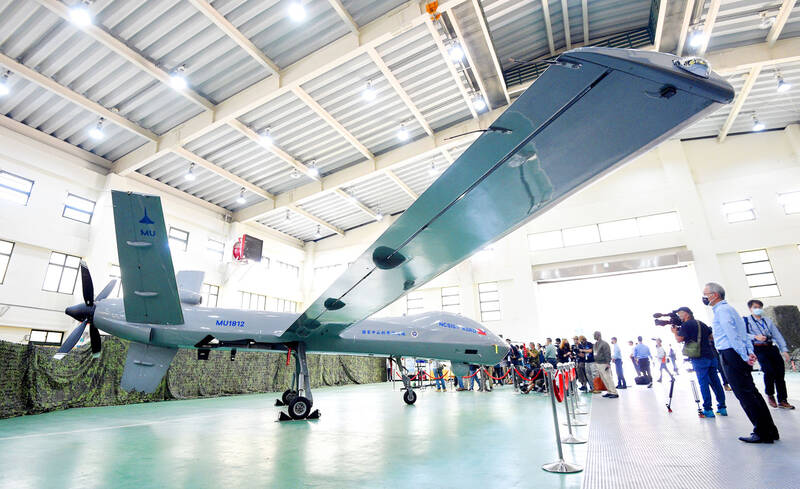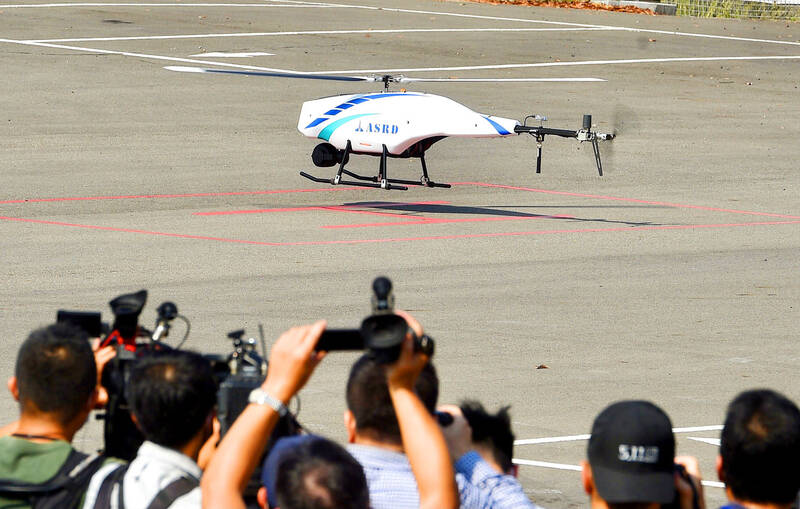The Chungshan Institute of Science and Technology yesterday unveiled its newest tactical close-range rotary-wing uncrewed aerial vehicle (UAV), saying that once it enters service, it would be tasked with tactical reconnaissance and monitoring of littoral and coastal areas.
The drone has a larger carrying capacity than its predecessors, can stay airborne for longer periods, provide extended monitoring of specific areas and withstand up to Beaufort scale 6 winds, the institute told a news conference in Taichung.
The Republic of China Army ordered 50 drones at a cost of NT$779.98 million (US$25.1 million) and has received 14 as of this year, army Chief of Staff Chang Yuan-hsun (章元勳) has said.

Photo: Lo Pei-te, Taipei Times
With the institute’s assistance, the army has 115 trained operators who have passed certification tests by the Civil Aeronautics Administration, Chang said.
The drone has a navigation and control radius larger than 30km, which, coupled with its ability to stay airborne for more than an hour, could enhance the military’s ability to reconnoiter and gain intelligence beyond visual range in real-time, said Chi Li-ping (齊立平), director of the institute’s Aeronautical Systems Research Division.
The drone can take off or return to base with just a tap of a button, follow preset routes and stay stationary to collect information, Chi added.

Photo: Lo Pei-te, Taipei Times
The institute also introduced the Teng Yun, or “Cloud Rider,” a large UAV designed to focus on range and digital intelligence gathering, the institute said.
Teng Yun can reach altitudes that allow it to be guided and controlled by satellites, stay airborne for long periods, has a large payload capacity, can autonomously land and take off via multiple uplink navigation and control uplink methods, and can provide long-range monitoring in real-time, it said.
Once fielded, the Teng Yun would allow the military’s drone fleet to be guided and controlled via satellite, the institute said, adding that it has completed development evaluations and is to undergo combat evaluations next year.
Asked what measures are being taken to prevent the use of China- manufactured parts, Chi said the institute conducts a thorough background check of all partner corporations and only collaborates with a company after verifying that it is not funded by Chinese capital and does not conduct large business transactions with China.
The institute also conducts rigorous security checks on all outgoing and incoming personnel while ensuring that all companies bidding for its projects sign a non-disclosure agreement and provide certified proof of the origins of their products, Chi said.

MAKING WAVES: China’s maritime militia could become a nontraditional threat in war, clogging up shipping lanes to prevent US or Japanese intervention, a report said About 1,900 Chinese ships flying flags of convenience and fishing vessels that participated in China’s military exercises around Taiwan last month and in January have been listed for monitoring, Coast Guard Administration (CGA) Deputy Director-General Hsieh Ching-chin (謝慶欽) said yesterday. Following amendments to the Commercial Port Act (商港法) and the Law of Ships (船舶法) last month, the CGA can designate possible berthing areas or deny ports of call for vessels suspected of loitering around areas where undersea cables can be accessed, Oceans Affairs Council Minister Kuan Bi-ling (管碧玲) said. The list of suspected ships, originally 300, had risen to about 1,900 as

Japan’s strategic alliance with the US would collapse if Tokyo were to turn away from a conflict in Taiwan, Japanese Prime Minister Sanae Takaichi said yesterday, but distanced herself from previous comments that suggested a possible military response in such an event. Takaichi expressed her latest views on a nationally broadcast TV program late on Monday, where an opposition party leader criticized her for igniting tensions with China with the earlier remarks. Ties between Japan and China have sunk to the worst level in years after Takaichi said in November that a hypothetical Chinese attack on Taiwan could bring about a Japanese

MORE RESPONSIBILITY: Draftees would be expected to fight alongside professional soldiers, likely requiring the transformation of some training brigades into combat units The armed forces are to start incorporating new conscripts into combined arms brigades this year to enhance combat readiness, the Executive Yuan’s latest policy report said. The new policy would affect Taiwanese men entering the military for their compulsory service, which was extended to one year under reforms by then-president Tsai Ing-wen (蔡英文) in 2022. The conscripts would be trained to operate machine guns, uncrewed aerial vehicles, anti-tank guided missile launchers and Stinger air defense systems, the report said, adding that the basic training would be lengthened to eight weeks. After basic training, conscripts would be sorted into infantry battalions that would take

DEEP-STRIKE CAPABILITY: The scenario simulated a PLA drill that turned into an assault on Taiwan’s critical infrastructure, with the launchers providing fire support Taiwan yesterday conducted this year’s first military exercises at Longsiang Base in Taichung, demonstrating the newly acquired High Mobility Artillery Rocket System’s (HIMARS) ability to provide fire support and deep-strike capabilities. The scenario simulated an attack on Penghu County, with HIMARS trucks immediately rolling into designated launch areas and firing barrages at the Wangan (望安) and Cimei (七美) islands, simulating the provision of fire support against invading forces. The HIMARS are supposed to “fire and leave,” which would significantly increase personnel and equipment survivability, a military official said. The drill simulated an exercise launched by the Chinese People’s Liberation Army (PLA) Eastern